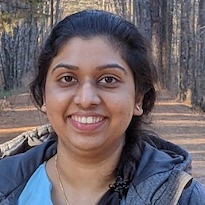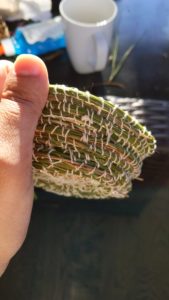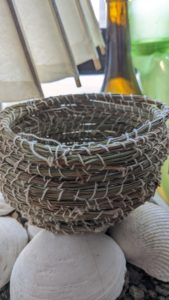 Dr. Aditi Mallavarapu is a Postdoctoral Researcher in Learning Sciences and Technology at the Center for Integrative Research in Computing and Learning Sciences (CIRCLS) and the Learning Sciences Research team at Digital Promise. In 2021, she graduated from the University of Illinois Chicago (UIC) with her Ph.D. in Computer Science. Her research projects all have the shared goal of building computational methods and tools to understand, support, and improve exploration-based learning in open-ended learning environments. We talked to Aditi to learn more about her and her innovative work.
Dr. Aditi Mallavarapu is a Postdoctoral Researcher in Learning Sciences and Technology at the Center for Integrative Research in Computing and Learning Sciences (CIRCLS) and the Learning Sciences Research team at Digital Promise. In 2021, she graduated from the University of Illinois Chicago (UIC) with her Ph.D. in Computer Science. Her research projects all have the shared goal of building computational methods and tools to understand, support, and improve exploration-based learning in open-ended learning environments. We talked to Aditi to learn more about her and her innovative work.
How did you choose your field of study? Was there a pivotal event that sparked your interest?
My interest in Computer Science developed organically and gradually. Since childhood, my parents nurtured my natural affinity to the field by introducing me to experts, scientists, and computer engineers through local science forums and science centers, indulging my curiosity and intellectual hunger. I was intrigued to communicate with the computer in its own language from an early age. My tinkering and experimenting resulted in some unique school projects with science and engineering aspects, including some burnt chips and ICs that would not see the light of day!
Crucial to my current research interest in designing data-driven computational methods for engineering and improving human learning in open-ended environments was my Master’s thesis dissertation at UIC. I was part of a team that designed a unique board game, Eco-Collage, specifically targeted to orient novice urban planning students to the nuances of the trade. This project was pivotal in helping me recognize the power of data to improve learning through the design of learning and teaching technology. Our work was recognized as the first to have applied computational methods to an open-ended learning environment. These initial experiences were all pivotal in shaping my research interest today.
Describe your research in five words.
Supporting large groups’ open-ended learning
Please share a bit more about your research in one to three sentences.
All my projects share the goal of designing data-driven computational methods for aiding learners to learn collaboratively in open-ended learning environments. In these environments, learners engage problems that have (a) multiple solutions, (b) multiple solution strategies for each solution, and (c) multiple solution paths for each strategy. I design computational methods that do not “close” the open-endedness of the problems but provide the learners with exploration support. This approach is conceptually different from the traditionally provided solution support that guides the learners toward a particular solution.
What do you hope to learn about as you participate in the Emerging Scholar CIRCLS?
My work has taught me that it is important to understand different perspectives on technology through its affordances and risks. I hope to leverage the emerging scholars’ hub to build collaborations with people from different fields and experiences, so we can contribute to the society-authentic human-centered learning technologies.
What are your passions outside of work and research? And why are they important to you?
I like to DIY small projects, mostly from things we would otherwise throw away. Over the holidays, I made small baskets out of pine needles while visiting my aunt’s place and hedgehogs from magnolia pods. I am very fond of knitting and sewing, which has allowed me to convert outdated jeans and dresses into cool skirts, bags, and quilts. These projects are my artistic, creative outlet and bring me back refreshed while reducing waste and creating something useful. As you may have guessed, I am a believer of reduce, reuse, and recycle.


If you could offer one piece of advice to your past, pre-graduate school self, what would it be?
Read a lot and ask people for help when you need it. People are more willing to help than not. Sometimes opportunities come from unexpected situations, so be bold—explore them!
